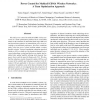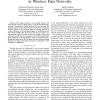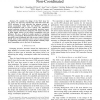113
Voted
WOWMOM
2005
ACM
15 years 8 months ago
2005
ACM
— We consider the design of optimal strategies for joint power adaptation, rate adaptation and scheduling in a multi-hop wireless network. Most existing strategies control either...
104
Voted
MSWIM
2005
ACM
15 years 8 months ago
2005
ACM
We investigate the impact of power control on latency in wireless ad-hoc networks. If transmission power is increased, interference increases, thus reducing network capacity. A no...
112
Voted
WIOPT
2005
IEEE
15 years 8 months ago
2005
IEEE
We study power control in multicell CDMA wireless networks as a team optimization problem where each mobile attains at the minimum its individual fixed target SIR level and beyon...
152
Voted
QSHINE
2005
IEEE
15 years 8 months ago
2005
IEEE
Abstract— Throughput is an important performance consideration for multihop wireless networks. In this paper, we study the joint link scheduling and power control problem, focusi...
109
Voted
LCN
2005
IEEE
15 years 8 months ago
2005
IEEE
— The seminar work of Gupta and Kumar [1] showed that multi-hop wireless networks with capacity scalable with the number of nodes, n, are achievable in theory. The transport capa...
154
Voted
IWCMC
2006
ACM
15 years 8 months ago
2006
ACM
The concept of multi-hop CDMA cellular networks has been around for sometime now. It is a widely accepted assumption that using multi-hopping in cellular networks will increase th...
124
Voted
VTC
2006
IEEE
15 years 8 months ago
2006
IEEE
— This paper presents a new pricing function for noncooperative power control game in a single cell CDMA data network. Considering a utility function for each terminal, the purpo...
118
Voted
VTC
2006
IEEE
15 years 8 months ago
2006
IEEE
— In this paper, we analyze the effect of interference diversity on the capacity of a cellular system that employs frequency hopping, power control and bit-interleaved coded modu...
103
Voted
ISCAS
2006
IEEE
15 years 8 months ago
2006
IEEE
— We consider the design of the MAC layer for low power, low data-rate, impulse-radio ultra-wide band (IRUWB) networks. In such networks, the primary concern is energy consumptio...
123
Voted
PAM
2007
Springer
15 years 8 months ago
2007
Springer
Abstract. The use of power control in wireless networks can lead to two conflicting effects. An increase in the transmission power on a link may (i) improve the quality and thus t...



